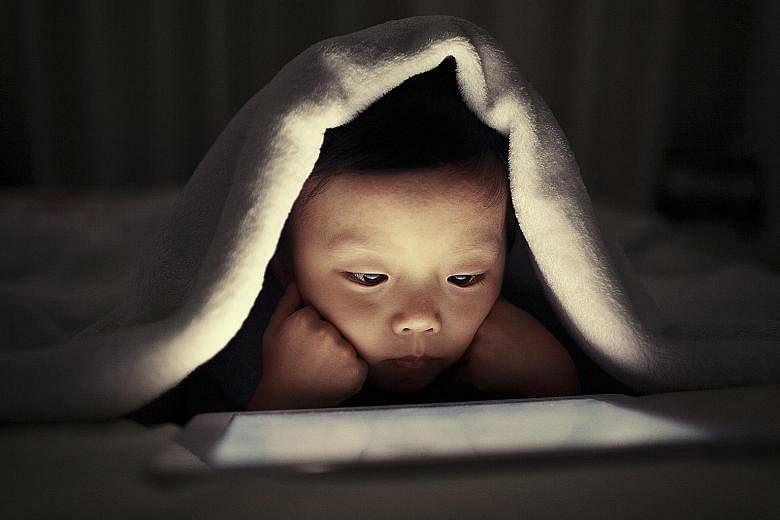WASHINGTON • An analysis of data from 26,000 children around the world, just published in the Journal of the American Medical Association (Jama), has provided the strongest evidence yet of a link between bedtime use of electronic devices and poor sleep, inadequate sleep and excessive daytime sleepiness.
While the popular characterisation of America's sleep-deprived children walking around like little zombies is a bit of an exaggeration, the problem is a serious one.
Researchers say that overscheduled and media-addicted children, especially teenagers, are experiencing an epidemic of sleep disorders and that this is contributing to all sorts of health issues, including obesity, depression, anxiety, hyperactivity, enhanced appetite, mood issues, slower reaction times and degraded memory.
In recent years, the United States Centres for Disease Control and Prevention has been pushing for later start times for schools as a way to increase the odds that teens can get an eight-hour minimum of sleep. The idea is supported by science but has been controversial for financial, logistical and political reasons.
The new Jama Paediatrics paper, led by researcher Ben Carter at King's College London, involved analysing past studies of children between the ages of six and 19 in North America, Europe, Asia and Australia.
Dr Carter and his colleagues found that children who use mobile media devices at bedtime are more than twice as likely to sleep fewer than nine hours a night.
-
Key findings
-
ACCESS TO DEVICES
Seventy-two per cent of all children and 89 per cent of adolescents have at least one mobile device in the bedroom, and most of them regularly use it before bedtime.
-
INADEQUATE SLEEP
In the study, 45.4 per cent of children who use their devices just before bedtime say they do not get enough hours of sleep a night, while 31.5 per cent of those who do not have such devices reported the same. -
POOR QUALITY OF SLEEP
Fifty-two per cent of children who use a mobile device before going to bed reported poor sleep quality, while only about 34 per cent of children with no access to such devices at bedtime reported the same.
Those who keep phones or other gadgets in their rooms are 50 per cent more likely to get poor sleep and 200 per cent more likely to be excessively sleepy during the day.
In a commentary accompanying the study, Professor Charles Czeisler from the sleep medicine division at Harvard Medical School and Dr Theresa Shanahan, a paediatrician at Harvard, explained that "the use of mobile media devices at bedtime provides socially and physiologically stimulating material at a time when the transition to sleep requires the brain to wind down".
"Interesting content is often difficult to resist and children frequently have a fear of missing out if they disconnect," they wrote.
Their commentary added that sleep and circadian disruption may also adversely affect the sleep-induced hormonal signals that occur during adolescent development.
"The use of mobile media devices in the bedroom at night enables children to explore the virtual world... free from oversight by sleeping parents and other family members, which may leave the child exhausted on school days or asleep during daytime hours on free days."
The researchers said the adverse effect of sleep deficiency on learning and memory, together with the recognition that many symptoms of sleep loss mimic those of attention- deficit hyperactivity disorder, raises serious ethical concerns about advertising that targets school-age children, touting the use of mobile media devices in the bedroom.
The issue is not just about delayed bedtimes. There is also a physical component to screen exposure.
Prof Czeisler and Dr Shanahan described the blue light emitted by screens, as well as by LED lamps, as "biologically potent" and said it suppresses the hormone melatonin, which tells the brain to sleep. And do not forget awakenings due to the ping of text messages.
They noted that the study shows that the mere presence of a device in the room at bedtime can cause sleep disturbances and suggested that more work needs to be done to understand what this is doing to children's minds and bodies.
WASHINGTON POST

